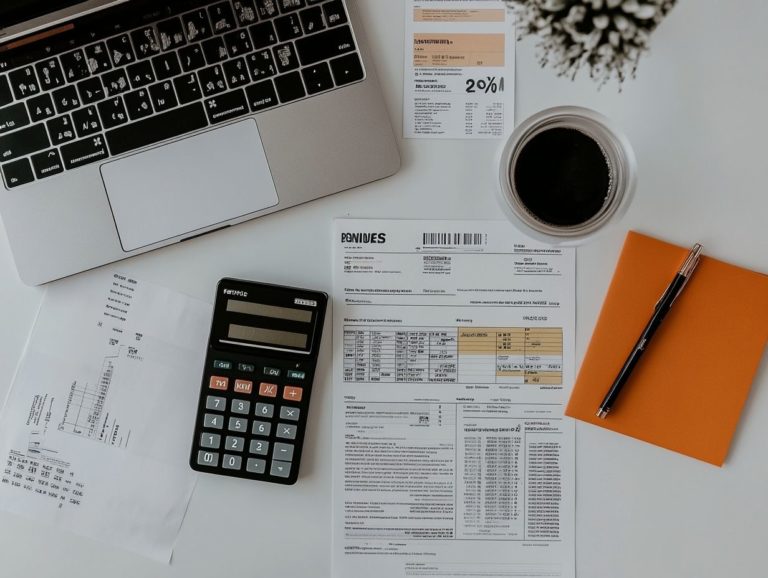How to Optimize Your Tax Refund as a Freelancer
Navigating the world of taxes as a freelancer can feel daunting. However, grasping the intricacies of your tax refund is essential for unlocking financial advantages.
Dive into the details of what a tax refund actually is and how it operates. This article also provides valuable insights into maximizing deductions tailored specifically for freelance work.
From meticulously tracking your expenses to harnessing available tax credits, you ll uncover practical strategies designed to significantly reduce your tax liability.
With thoughtful planning, you can transform tax season into a prime opportunity for financial growth. Immerse yourself in this exploration to uncover the keys to optimizing your tax refund!
Contents
- Key Takeaways:
- Understanding Tax Refunds for Freelancers
- Maximizing Deductions for Freelancers
- Utilizing Tax Credits as a Freelancer
- Strategies for Reducing Tax Liability
- Frequently Asked Questions
- 1. How can I optimize my tax refund as a freelancer?
- 2. What are some common deductions and credits that freelancers can claim?
- 3. Should I make estimated tax payments as a freelancer?
- 4. What records should I keep as a freelancer to help optimize my tax refund?
- 5. Can I deduct my home office if I work from home as a freelancer?
- 6. Are there any specific tax benefits for freelancers?
Key Takeaways:

- Learn the basics of tax refunds as a freelancer, including what they are and how they work, to effectively navigate tax season.
- Maximize your deductions by familiarizing yourself with common deductions and implementing effective tracking and documentation practices.
- Utilize tax credits to reduce your tax liability, including understanding the types available and how to qualify and claim them.
Understanding Tax Refunds for Freelancers
Understanding tax refunds as a freelancer is vital during tax season. It requires you to navigate the intricate landscape of taxes for independent workers and IRS regulations.
You need to grasp how your income and expenses influence your tax refunds, particularly regarding tax preparation and managing your business expenses. By refining your tax strategy, you can significantly boost your refunds.
Familiarizing yourself with the nuances of your financial situation and the deductions available to you is essential.
What is a Tax Refund and How Does it Work?
A tax refund is your way of getting reimbursed by the government for any taxes you’ve overpaid. This holds particular significance for freelancers managing their self-employment income.
As an independent worker, you often encounter unique challenges in handling your taxes, especially when your income can vary dramatically from month to month. To figure out if you’re eligible for a refund, consider your deductions, estimated tax payments, and overall tax obligations. For guidance on this process, navigating quarterly taxes as a freelancer can be incredibly helpful. The IRS, or Internal Revenue Service, oversees tax laws and frequently reviews filings to ensure everything aligns with them.
Accurate tax preparation is crucial for maximizing your refunds. Even minor mistakes can result in missed opportunities or unwanted delays. Be mindful of common pitfalls, like underreporting your income or overlooking eligible business expenses, to ensure your tax return truly reflects your financial situation.
By staying diligent and informed, you can navigate the complexities of tax season with a sense of confidence and clarity.
Maximizing Deductions for Freelancers
Maximizing deductions is an essential strategy for freelancers like you, as it allows you to effectively reduce your taxable income and enhance your tax refunds. It’s important to grasp which business expenses qualify for these deductions, ensuring you leverage every opportunity available.
Common Deductions for Freelancers

Freelancers can take full advantage of several common deductions that significantly reduce taxable income. These include home office expenses, mileage deductions, and costs related to advertising and office supplies. By leveraging these deductions effectively, you can optimize your financial health.
For example, home office expenses can include a portion of your rent or mortgage interest, utilities, and internet costs, all calculated based on the square footage designated for your workspace. In terms of mileage deductions, track the business-related mileage you drive, keeping a logbook to justify the distance traveled.
Expenses for advertising can range from website hosting to social media ads, all of which are eligible for deduction. It s essential to maintain meticulous records of these expenses; this not only helps you accurately claim them but also provides vital proof during potential audits.
This way, you can maximize your allowable deductions while staying compliant with tax regulations.
Tips for Tracking and Documenting Expenses
Tracking and documenting your expenses is crucial as a freelancer. This ensures you can claim all eligible tax deductions and comply with IRS regulations during tax preparation.
Maintaining a comprehensive record of your business-related expenses can make things easier when tax season rolls around. Consider leveraging accounting software or specialized apps designed for expense tracking. These tools simplify categorization and make retrieving information a breeze whenever you need it.
Whether you keep physical or digital receipts, it’s essential to hold onto those documents. They serve as proof of your expenses and can protect you in the event of an audit. By organizing your records systematically, you not only ensure compliance but also set yourself up to maximize your deductions. This ultimately fosters better financial management and planning.
Utilizing Tax Credits as a Freelancer
Utilizing tax credits can offer you significant financial relief as a freelancer. By taking advantage of these credits, you can effectively lower your overall tax liability and maximize your refunds when tax season arrives.
Types of Tax Credits Available
Freelancers have access to a range of tax credits that can significantly lighten their tax burdens, including credits for education expenses and health insurance premiums.
These credits not only ease financial stress but also encourage ongoing education and personal well-being. For example, education credits are tailored for freelancers seeking further qualifications or training that enhance their skill sets. To qualify, you typically need to meet certain criteria related to enrolled courses and income limits.
Health insurance premium credits, on the flip side, help with the costs of securing your own coverage, offering essential financial relief. To successfully claim these credits, it’s crucial for freelancers to carefully report their expenses and income on their tax returns, often necessitating detailed documentation and forms that prove their eligibility. For a deeper understanding, freelancers should consider resources like Maximizing Deductions: A Freelancer’s Guide.
How to Qualify and Claim Tax Credits

To qualify for and successfully claim tax credits, you must adhere to specific eligibility criteria set by the IRS, ensuring you fully understand the requirements for each credit.
Gather all necessary documentation, including income statements, expense records, and any relevant tax forms, to support your claims.
Carefully tracking your expenses throughout the year is essential; it helps you avoid missing out on deductions that could further reduce your taxable income.
Be mindful of common pitfalls, such as failing to claim credits for which you are eligible, misreporting your income, or overlooking critical filing deadlines. Staying informed and organized is not just a good idea; it’s crucial for maximizing your tax benefits. To learn more about avoiding these issues, check out the top tax mistakes freelancers make while ensuring compliance with IRS regulations. Don’t miss out on valuable deductions! Stay organized and informed to maximize your tax benefits.
Strategies for Reducing Tax Liability
Implementing effective strategies for reducing tax liability is crucial for you as a freelancer. By doing so, you can optimize your financial situation and ensure you are well-prepared for future tax seasons.
This proactive approach protects your earnings and gives you the power to make informed financial decisions.
Income Shifting and Retirement Contributions
Income shifting and making strategic retirement contributions can profoundly influence your tax liability as a freelancer, presenting valuable opportunities for long-term savings and tax benefits.
By understanding structured strategies, you can effectively reduce your tax burden while enhancing your income potential.
For example, utilizing an S Corporation allows you to pay yourself a reasonable salary and take the rest of your income as a distribution, which can significantly lower your self-employment tax.
Exploring various retirement account options, such as a Solo 401(k) or a SEP IRA, gives you the power to save for retirement while enjoying delayed taxes. These accounts not only help safeguard your financial future but also provide immediate tax deductions, showcasing a dual advantage for independent workers maneuvering through their financial situation.
Tax Planning for Future Years
Effective tax planning for future years is essential for freelancers like you, enabling you to manage your self-employment taxes while adhering to IRS requirements and optimizing your financial growth.
By anticipating income fluctuations and estimating future tax obligations, you can set aside the right funds throughout the year, effectively minimizing the risk of financial strain when tax season rolls around.
Tracking your income carefully is essential! It’s crucial to consider making quarterly payments to sidestep any penalties.
Incorporating retirement accounts into your strategy not only allows for tax deferral but also establishes a safety net for your future. Options such as a Solo 401(k) or SEP IRA can significantly boost your financial stability for the future while simultaneously reducing your taxable income today.
Frequently Asked Questions

1. How can I optimize my tax refund as a freelancer?
As a freelancer, there are several ways you can optimize your tax refund. These include keeping track of your business expenses, taking advantage of deductions and credits, and making estimated tax payments throughout the year.
2. What are some common deductions and credits that freelancers can claim?
Freelancers can deduct expenses such as home office, supplies, travel, and healthcare costs, among others. They can also claim credits for retirement contributions, education expenses, and health insurance premiums.
3. Should I make estimated tax payments as a freelancer?
Yes, it’s recommended that freelancers make estimated tax payments throughout the year to avoid owing a large tax bill at the end of the year. This is especially important if you expect to owe more than $1,000 in taxes for the year.
4. What records should I keep as a freelancer to help optimize my tax refund?
It’s important to keep records of all your business expenses, income, and receipts. This will not only help you accurately claim deductions and credits but also serve as proof in case of an audit.
5. Can I deduct my home office if I work from home as a freelancer?
Yes, as long as your home office is used exclusively for business purposes, you can deduct a portion of your rent, utilities, and other related expenses. The key is to keep detailed records and only claim the space that is used solely for work.
6. Are there any specific tax benefits for freelancers?
Yes, there are several tax benefits specifically for freelancers, such as the ability to deduct business-related travel, meal, and entertainment expenses. There are also retirement plans, such as a Solo 401(k) or SEP IRA, that can offer tax advantages for self-employed individuals.
Consider consulting with a tax advisor or exploring retirement account options today!






